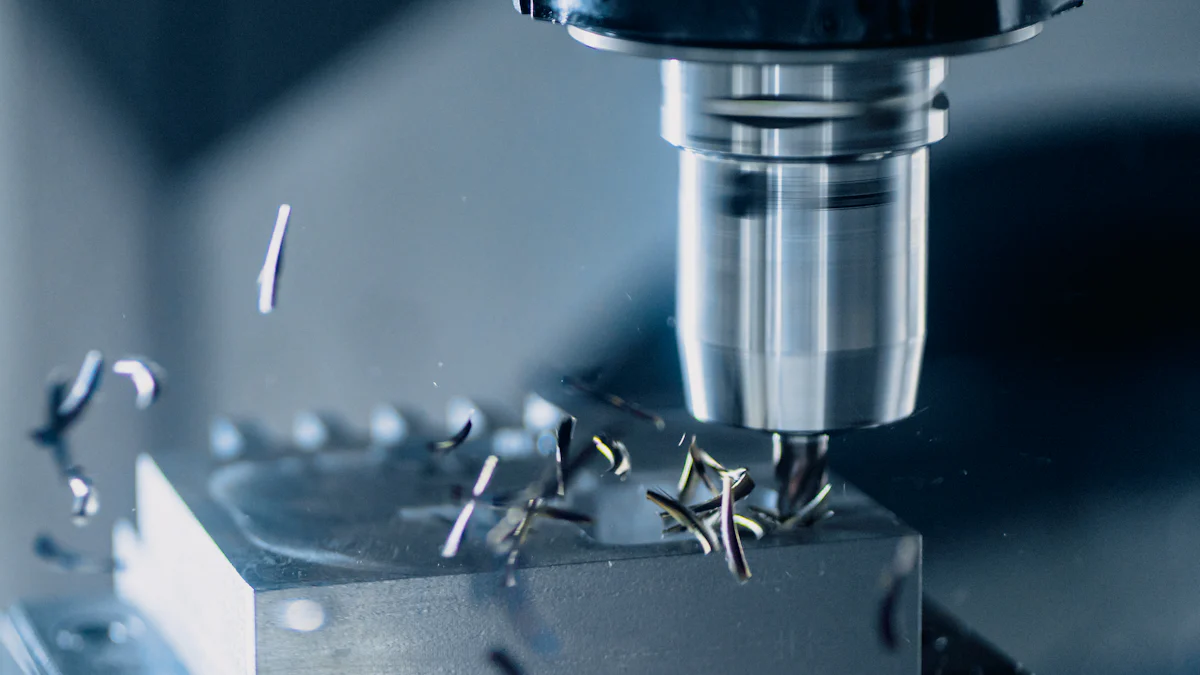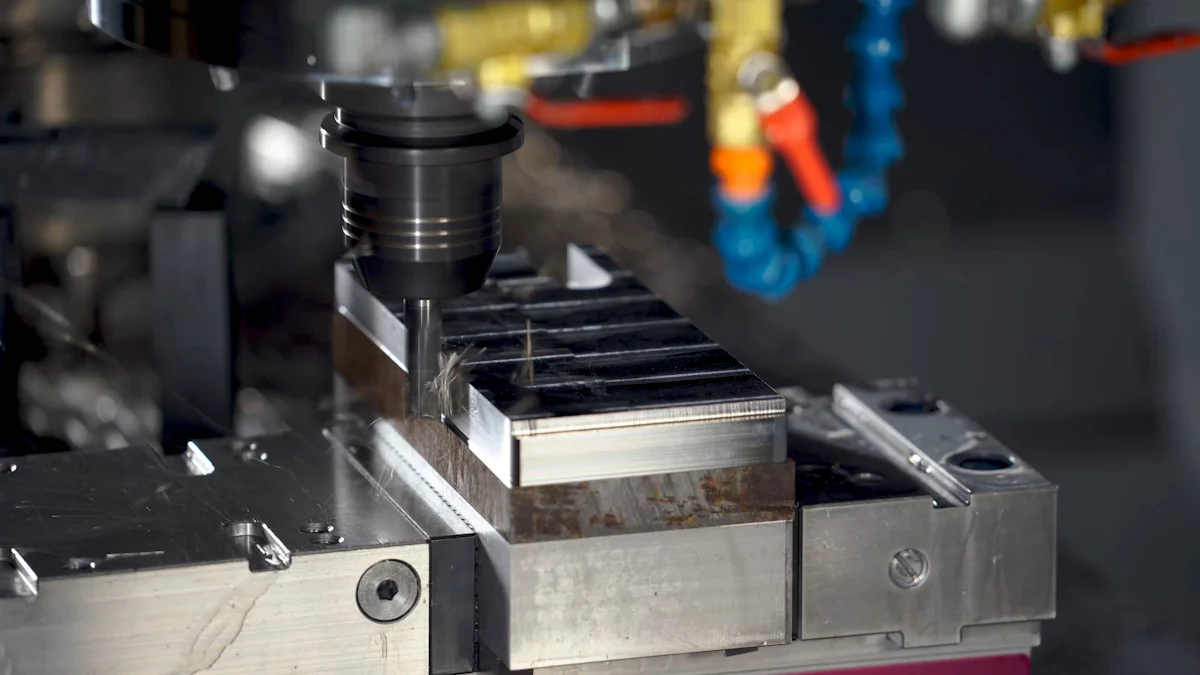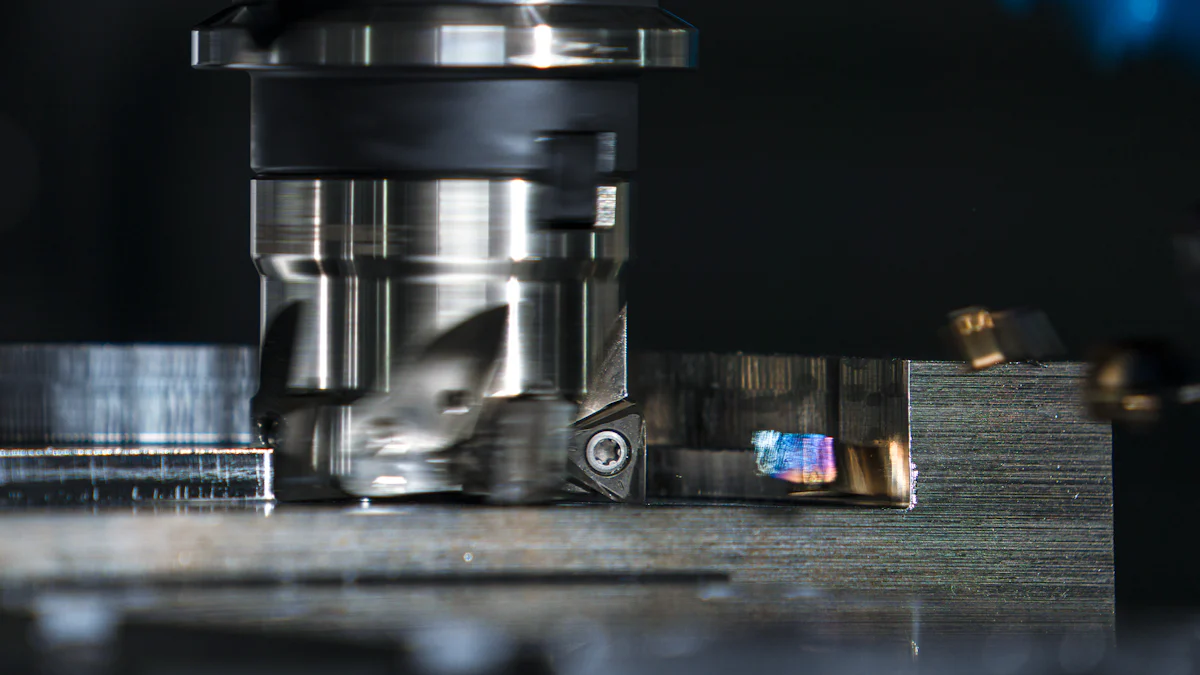How CNC Handles Exotic Metals Like Inconel and Monel

CNC machining allows you to work with exotic metals like Inconel and Monel, which are prized for their exceptional properties. Inconel, with its high nickel and chromium content, excels in heat resistance and strength, making it ideal for aerospace applications like turbine blades. Monel, on the other hand, combines nickel and copper to deliver outstanding corrosion resistance, especially in marine environments. These metals also find use in industries like oil and gas, where extreme conditions demand durability. Despite challenges like tool wear and cost, CNC machining ensures precision and efficiency, making it indispensable for handling these advanced materials.
Key Takeaways
CNC machines are important for cutting tough metals like Inconel and Monel. These metals resist heat and don’t rust easily.
To avoid tool damage and keep cuts accurate, use special tools. These tools have heat-proof coatings and need the right cutting speeds.
Use strong coolant systems to cool things down while cutting. This keeps tools working longer and protects the metal.
Check tools often and adjust CNC machines to stay precise. This stops problems from happening during work.
CNC machines save time and money by wasting less material. They also make parts faster, which is great for planes and ships.
Challenges of CNC Machining Exotic Metals

Properties of Inconel
High strength and heat resistance
Inconel's high strength and heat resistance make it a go-to material for extreme environments, but these same properties create challenges during machining. Its resistance to deformation means you need to apply higher cutting forces, which can accelerate tool wear. Additionally, Inconel generates significant heat during machining, requiring advanced cooling strategies to prevent thermal damage to both the tool and the workpiece.
Work hardening during machining
Inconel hardens rapidly when machined, a phenomenon known as work hardening. This makes the material tougher as you cut, increasing the difficulty of shaping it. You must carefully optimize cutting speeds and feeds to avoid excessive hardening, which can lead to tool failure and dimensional inaccuracies.
Properties of Monel
Corrosion resistance and toughness
Monel's exceptional corrosion resistance and toughness make it ideal for marine and chemical applications. However, these same qualities complicate machining. Its toughness demands specialized tools and techniques, similar to those used for stainless steel, to achieve precision without damaging the material.
Stability at high temperatures
Monel remains stable at high temperatures, which is beneficial for many applications. However, this stability also means it resists cutting forces, leading to rapid tool wear. You need to use tools with heat-resistant coatings and ensure proper cooling to maintain machining efficiency.
General Machining Challenges
Rapid tool wear and heat generation
Exotic metals like Inconel and Monel are notorious for causing rapid tool wear. Their hardness and poor thermal conductivity concentrate heat at the cutting zone, which can damage tools and compromise surface quality. Using coated tools and high-pressure coolant systems can help mitigate these issues.
Risk of material deformation
Machining exotic metals often involves high cutting forces, which can cause workpiece deflection or deformation. This affects dimensional accuracy and surface integrity. To counter this, you should secure the workpiece firmly and monitor the machining process closely to maintain precision.
CNC Machining Techniques for Exotic Metals
Cutting Speeds and Feeds
Managing heat with slower cutting speeds
When machining exotic metals, heat management becomes critical. Slower cutting speeds help reduce the heat generated at the cutting zone. This prevents thermal damage to both the tool and the workpiece. By controlling the speed, you can maintain the integrity of the material and extend the life of your cutting tools. This approach is especially effective for materials like Inconel, which generate significant heat during machining.
Preventing work hardening with optimized feed rates
Optimized feed rates play a key role in preventing work hardening. If the feed rate is too slow, the cutting tool may rub against the material instead of cutting it cleanly. This increases the hardness of the material, making it more difficult to machine. By selecting the right feed rate, you can ensure smooth cutting and avoid unnecessary tool wear.
Toolpath Optimization
Reducing tool engagement and heat buildup
Efficient toolpath design minimizes tool engagement with the material. This reduces the amount of heat generated during machining. Shorter tool engagement times also lower the risk of tool wear and deformation. You can achieve this by programming the CNC machine to follow paths that distribute cutting forces evenly.
Ensuring consistent material removal
A well-optimized toolpath ensures consistent material removal. This prevents uneven surfaces and maintains dimensional accuracy. By using advanced CNC machining software, you can create toolpaths that balance cutting forces and improve the overall quality of the finished product.
Cooling and Lubrication
High-pressure coolant systems
High-pressure coolant systems are essential for machining exotic metals. These systems dissipate the heat generated during cutting, preventing thermal expansion and tool deformation. They also maintain a stable temperature, which helps avoid thermal damage to the workpiece. Additionally, coolants aid in chip evacuation, keeping the cutting area clean and efficient.
Advanced lubricants for friction reduction
Lubrication reduces friction between the cutting tool and the material. This minimizes heat generation and prevents tool wear or breakage. Advanced lubricants also facilitate smooth chip evacuation, ensuring accuracy in machining operations. By using the right combination of coolants and lubricants, you can enhance the efficiency of CNC machining processes.
Tip: Always monitor coolant flow and lubricant application to ensure optimal performance during machining.
Specialized Tools and Equipment for CNC Machining

Cutting Tools
Carbide and ceramic tools
When machining exotic metals like Inconel and Monel, you need cutting tools that can withstand extreme conditions. Carbide tools with a high positive rake angle are highly effective. They offer strength and efficiency, making them ideal for handling the toughness of these materials. Ceramic cutting tools are another excellent option. They allow for fast, continuous cuts, which helps minimize the risk of work hardening. High-speed steel tools can also be used, but they are less durable compared to carbide or ceramic options.
Heat-resistant coatings like TiAlN
Heat-resistant coatings, such as titanium aluminum nitride (TiAlN), significantly enhance tool performance. These coatings improve the operational life of tools under high temperatures. TiAlN maintains its hardness even at elevated cutting temperatures, making it suitable for high-speed machining. It also provides excellent oxidation resistance and thermal stability, which are essential for dry milling applications. By using coated tools, you can achieve better results and reduce tool wear.
CNC Machines
Rigid, vibration-resistant machines
Machining exotic metals requires CNC machines with rigid structures. These machines resist vibrations, ensuring precise cuts and preventing errors caused by instability. A stable machine setup is crucial when working with materials that demand high cutting forces.
Advanced control systems for precision
Modern CNC machines come equipped with advanced control systems. These systems allow you to achieve precision down to fractions of a millimeter. They also enable the production of complex designs that would be challenging with manual processes. With these features, you can maintain accuracy and efficiency while minimizing material waste.
Maintenance and Monitoring
Regular tool inspection
Regular tool inspection is essential for machining exotic metals. These materials exert higher cutting forces, which can wear out tools quickly. By inspecting tools frequently, you ensure they remain suitable for the task. This practice helps maintain machining accuracy and prevents unexpected tool failures.
Machine calibration for accuracy
Machine calibration plays a vital role in ensuring precision. Over time, factors like vibration and wear can affect a machine's alignment. Regular calibration ensures the machine operates at peak performance. Tasks like checking spindle alignment and running backlash programs help maintain accuracy and consistency in your machining operations.
Note: Following a structured maintenance schedule, including daily, monthly, and annual tasks, ensures your CNC machine remains reliable and efficient.
Benefits of CNC Machining for Exotic Metals
Precision and Consistency
Achieving tight tolerances
CNC machining excels at achieving tight tolerances, which is essential when working with exotic metals like Inconel and Monel. You can rely on its precise programming and specialized tooling to handle the unique properties of these materials. This ensures that even the most demanding specifications are met. For industries like aerospace and medical devices, where accuracy is critical, CNC machining delivers components that fit perfectly and perform reliably under extreme conditions.
Consistency across production runs
Consistency is another key advantage. CNC machining allows you to produce identical parts across multiple production runs. This is especially important for large-scale manufacturing, where maintaining uniformity is crucial. The technology ensures that every piece meets the same high standards, reducing the risk of errors and improving overall quality.
Efficiency and Cost Savings
Minimizing material waste
CNC machining minimizes material waste by using precise cutting paths and optimized machining strategies. This approach ensures efficient material removal while maintaining dimensional accuracy. Unlike manual processes, CNC machining allows you to create complex designs with minimal waste, making it a cost-effective solution for working with expensive exotic metals.
Faster production times
You can achieve faster production times with CNC machining. Advanced programming and automation streamline the manufacturing process, reducing the time required to produce each part. This efficiency not only saves time but also lowers production costs, making it an ideal choice for industries that demand quick turnaround times.
Versatility in Applications
Aerospace, marine, and energy industries
CNC machining plays a vital role in industries like aerospace, marine, and energy. Its ability to produce precise and complex parts makes it indispensable for applications such as turbine blades, radar components, and marine hardware. The technology supports the use of materials like titanium, stainless steel, and superalloys, which are essential for these high-performance sectors.
Handling complex geometries
With advanced 4-axis and 5-axis CNC machines, you can create intricate shapes and complex geometries in a single setup. This capability saves time and reduces costs while ensuring high precision. Whether you need components for aerospace systems or custom parts for energy applications, CNC machining provides the flexibility to meet your requirements.
Tip: When working with exotic metals, always choose the right CNC machine and tooling to maximize efficiency and precision.
CNC machining plays a vital role in handling exotic metals like Inconel and Monel. These materials, known for their heat resistance, corrosion resistance, and durability, are essential for industries like aerospace and medical. You benefit from advanced techniques such as optimized tool geometry, high-pressure coolants, and precise machining parameters. Future advancements, including AI and 3D printing, promise even greater efficiency and design possibilities. By leveraging CNC machining, you can achieve precision, efficiency, and versatility, making it the preferred choice for high-performance applications.
FAQ
What makes Inconel and Monel challenging to machine?
Inconel and Monel resist heat and deformation, which increases tool wear. Inconel work-hardens during machining, while Monel’s toughness resists cutting forces. These properties require specialized tools and techniques to ensure precision.
How do you prevent tool wear when machining exotic metals?
Use carbide or ceramic tools with heat-resistant coatings like TiAlN. Optimize cutting speeds and feeds to reduce heat. High-pressure coolant systems also help dissipate heat and extend tool life.
Can CNC machines handle complex designs with exotic metals?
Yes, advanced 4-axis and 5-axis CNC machines can create intricate geometries. These machines ensure precision and consistency, even with tough materials like Inconel and Monel.
Why is cooling important during CNC machining?
Cooling prevents heat buildup, which can damage tools and deform the material. High-pressure coolant systems and advanced lubricants improve machining efficiency and maintain material integrity.
Which industries benefit most from CNC machining exotic metals?
Industries like aerospace, marine, and energy rely on CNC machining. It produces durable, high-performance components like turbine blades, marine hardware, and energy system parts with precision and efficiency.
Tip: Always match your tools and techniques to the specific properties of the exotic metal for the best results.
See Also
CNC Machining Aluminum Alloys 6061 And 7075: A 2024 Overview
CNC Machining Insights: Precision Manufacturing And Metal Processing
CNC Precision Machining: Key Material Requirements Explained
The Impact Of CNC Machining On Precision Manufacturing Excellence
CNC Machining 7075 Aluminum Alloy: Processes And Practical Uses
About US
Follow Us
Your prototype holds unparalleled significance, and we deeply value its uniqueness. Collaborating with you during the preparation phase for running your prototype or parts is a commitment we gladly embrace. Whether it's a single part or a complex assembly, we are dedicated to selecting the optimal tools and pathways to bring your envisioned product to life.
At Precision Fab CNC Machining, we specialize in producing parts for prototypes, short runs, and high-volume production. Our prototyping machine capabilities extend across metal, plastic, and wood machining, with welding fabrication services available to complement and finalize your prototype if required.
Address
Address: Room320 10F, Building A,Nanshan international building, Dayawan District, Huizhou, Guangdong, 516001 China
Contacts
billy@timaycnc.com

